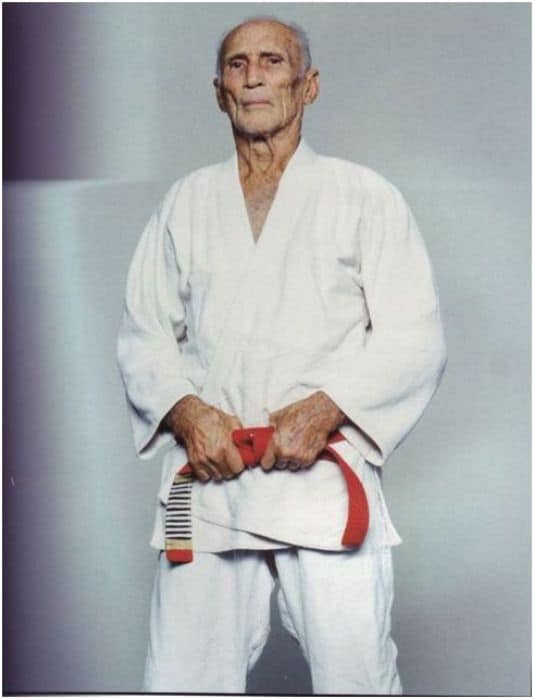Are you wondering if you should start Jiu-Jitsu and your 30th, 40th, 50th, 60th, maybe even 70th Birthday is right around the corner? I have good news for you, it’s never too late to start anything in life and Jiu-Jitsu shouldn’t be something you keep wondering about. There are people in the classes I attend that started Jiu-Jitsu in their late 60’s!
Brazilian Jiu-Jitsu can be adapted for people of all ages, from 5 years old to 90 years old. Age is not a factor in Jiu-Jitsu when it comes to technical skill; however, it will be a factor in physical ability, conditioning, and recovery. Past injuries or health concerns can be worked around, just be sure to take care of your recovery. Progression is unique to you, enjoy the journey at the pace that fits your life.
Is There An Age Cut Off To Start BJJ?
There is no age cut off to start Jiu-Jitsu. Brazillian Jiu-Jitsu is the best example of older people becoming masters of the art. Let’s take a look at Hélio Gracie and Carlos Gracie, who together founded the martial art of Gracie Jiu-Jitsu, aka Brazillian Jiu-Jitsu.
Although these two have been training since they were young, Hélio Gracie was still teaching classes up until 10 days before he passed away at 95 years old! While Carlos Gracie trained well into his 60’s.

Now you may be thinking, well, that doesn’t prove there isn’t a cut off to start Jiu-Jitsu. And you’re right; however, it is a great example that it is possible to train BJJ at any age.
I know people in my class that are in their 20, 30, 40, 50, and 60’s! I started Jiu-Jitsu when I was 29 going on 30 years old. There is another person in my class that started a month or two before me, and they are in their 40’s (they have a vicious choke!). Not only did they start BJJ, but they also started Muay Thai!
Are you 50 and think that you’re age is cut off from starting? Well, there is also a 50-year old that occasionally comes to the same Jiu-Jitsu class I am in. There is another person that I know who started when he was in his late 60’s. And believe me, he is one tough rolling partner!
“The best time to have started training Jiu-Jitsu was 20 years ago.
Anonymous
The 2nd best time is NOW!”
Is Age A Factor In BJJ?
Age is not a factor in Jiu-Jitsu when it comes to technical skill; however, it will be a factor in physical ability, conditioning, and recovery. The ability to move quickly goes away, you may get gassed out sooner than you want, and recovery might take longer between training sessions.
Always remember that even the people who have trained Jiu-Jitsu from a young age had to change the way they train. Feel free to ask them how differently their BJJ game is now compared to when they started. Chances are they do their rolls at a slower pace and focus on the details much more.
Don’t worry if you’re intimidated to start because of the rolling (sparring). Rolling is always optional or not allowed until the blue-belt level at some gyms! That means practicing and drilling are the primary focus, which will not require a very intense cardio session.
Technical Skill
Jiu-Jitsu is a martial art about leverage and momentum. It doesn’t require extreme strength, speed, or athleticism to be successful. The more techniques you learn the more you’ll start to notice that the same concepts are applied in many different applications.
Breaking down a technique and learning its core values will help tremendously, especially for older individuals. Once the basics of techniques are realized it’ll be possible to speed up learning other technical skills by applying the proper leverage and momentum.
Keep rolling light-hearted and develop technical skills and details instead of attempting to win every exchange in every roll. Drills will be a great way to practice technical skills with less impact on your body.
Physical Ability
A person’s physical ability decrease as we age. This is because the maximum exercise capacity decreases as we age, normally starting in our 20’s. As our maximum capacity starts to decrease we may start noticing that we’re unable to be as intense as we used to be or retain as much muscle.
A lot of older people that do Jiu-Jitsu noticed that they were slower and less explosive than their younger counterparts. The great part about doing Jiu-Jitsu with Gi is that it’s possible to slow down the pace of a roll.
If you’re not thinking about competing then you don’t need to start standing up. Not starting a roll standing up will eliminate the potential for being on the receiving end of a take-down. Which means you don’t have to deal with the explosiveness of someone in their 20’s. You will have lots of opportunities to work your magic on the ground!
Conditioning
The heart, like every other muscle in your body, can weaken over time, especially if you aren’t active. Just like building muscle, it gets harder to build your cardio/conditioning as you age. But, that doesn’t mean you can’t and there are many examples of older people outperforming younger people.
The reason why the maximum potential of conditions may not ever reach that of someone in their 20’s is the heart rate is slightly lower the older we get. During exercise, older people’s heart rate does not increase as much as in younger people either. Unlike at rest where both hearts function almost the same.
The heart becomes stiff the older the body gets, while arteries and arterioles become less elastic. The result is the heart cannot relax as quickly during the pumping of the heart which leads to an increase in blood pressure.
Don’t worry though! Exercise will help maintain and increase cardiovascularly and muscular fitness. And, Jiu-Jitsu is fantastic cardio that also builds muscles. The rolling portion of the class serves as a great cardio workout from all of the pushing, pulling, and holding.
Recovery
Recovery usually starts to slow down the older a person gets; however, research on age-related muscle recovery has inconsistent results. However, many feel as though recovery time is the single factor that is most affected by age. The main reason why recovery may be slower than someone younger could be significantly lower muscle protein synthesis.
Many older people who train Jiu-Jitsu find that their ability to train is slower because of muscle soreness the next day. Where younger people seem to win on recovery you can usually win the ability to control your training schedule. Having a set, consistent training schedule leads to results. While a career may allow you to afford one-on-one privates lessons.
An interesting result I found while researching was, “older athletes tend to recover better from intense cycling, for example than from exercise like running, which leads to greater muscle damage”, European Journal of Applied Physiology. This could mean that the type of exercise may contribute to the recovery.
The bottom line is that recovery may be slower the older a person gets; however, proper sleep and nutrition can help alleviate the time it takes. Although you may be sore longer after an intense Jiu-Jitsu roll than someone younger, having the ability to control your training schedule will allow better recovery.
Remember that if you’re just starting Jiu-Jitsu, it does not have to be intense. Keep it slow at first which will lead to less impact and less train on your muscles.
Keep Expectations Realistic
The premise is every 10 years is a belt and every 20lbs (9kg) is a belt. The reality is people have varying skill levels and progression rates! So, even though the statement has some truth to it, it is not set in concrete. The statement is to keep expectations realistic, there is a reason there are weight classes in fighting and age groups in competitions!
There are benefits of being older in Jiu-Jitsu. You have far more years of life experience behind you. Life experience comes with many different obstacles that had to be overcome leading to better decision-making. On top of that, if you’ve had children, you better believe your multitasking ability is above average!
Starting Jiu-Jitsu at an older age does have some disadvantages that come with growing older. The key thing to remember is, keep expectations realistic. What does that mean? Keeping up with the younger students in the class might not be a viable option. Recovery time may be slower – which could result in slower progress. Prior commitments in life, such as a wife and kids, may keep you from class one night too.
That doesn’t mean you’re never going to be good at Jiu-Jitsu or that you’ll never get your next belt. There are so many examples of older people becoming amazing practitioners. The classes I attend are perfect examples. Ages ranging from 20-60 and every single one of those students presents different challenges every time I roll with them.
Progress At Your Own Pace
The most important aspect to remember about your Jiu-Jitsu journey is that your progression is unique to you. One of the hardest things not to do is compare yourself to others in the class. I know for myself, I see others in the gym progressing at a much quicker than I am, and if I let myself dwell on it, it can be frustrating.
Getting older can lead to taking a bit longer to learn new skills than our younger self. It is important to remember this if you’re feeling discouraged that a younger student is catching on quicker than you. Or, if you’re not grasping a new technique quickly.
Learning does not happen at the same rate between individuals either. There may be techniques that your brain understands easier than others, despite how basic or complex the techniques may be. In the beginning, everything is going to be very foreign and even though your mind understands what to do, your body sometimes won’t cooperate.
I remembering trying to learn how to do a basic, sideways roll. That sideways roll took me so many classes just to get a half-decent one! I was watching everyone get it within 1 or 2 classes, while I was still struggling 12 classes later!
The great part about Jiu-Jitsu is that the progression is unique to you. Don’t try to rush it, especially when you start. The physical demands of Jiu-Jitsu will require your body some time to adjust to it. The older you are the more time you may need to recover. Heck, even at 30 I need time to recover and keep my body working right!
Conclusion
In conclusion, it is never too late to start Jiu-Jitsu, no matter the age. The primary factors that slow older individuals down are their physical ability, conditioning, recovery, and past injuries.
Age is not a factor in Jiu-Jitsu when it comes to technical skills and knowledge. Jiu-Jitsu is a martial art about leverage and momentum. It doesn’t require extreme strength, speed, or athleticism to be successful.
The reality is people have varying skill levels and progression rates no matter the age! The key is to pace yourself and enjoy the learning process. And before you know it, you’ll be trading that white-belt in for a blue-belt!
Sources
de Souto Barreto P, Rolland Y, Vellas B, et al: Association of Long-Term Exercise Training With Risk of Falls, Fractures, Hospitalizations, and Mortality in Older Adults: A Systematic Review and Meta-analysis. JAMA Intern Med.179(3):394-405, 2018. doi:10.1001/jamainternmed.2018.5406.
Harvard Men’s Health Watch. (2018). Get Moving to Slow Cardiovascular Aging: Keep Your Heart Strong and Young by Giving it a Good, Regular Workout. https://www.health.harvard.edu/heart-health/get-moving-to-slow-cardiovascular-aging .
Sultana, F., Abbiss, C.R., Louis, J. et al. Eur J Appl Physiol (2012) 112: 1549. https://doi.org/10.1007/s00421-011-2115-9

